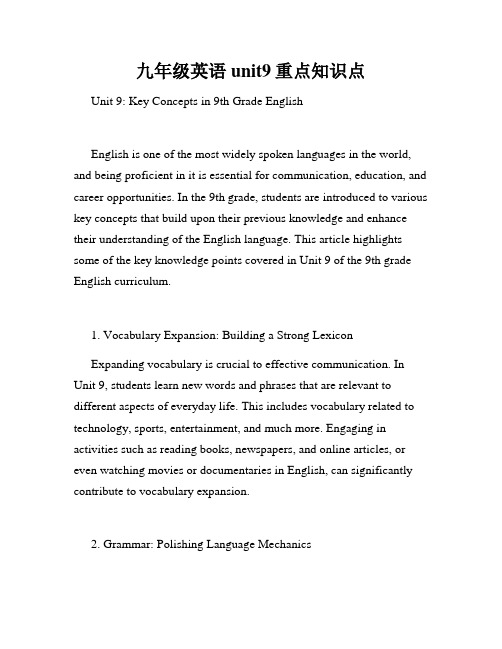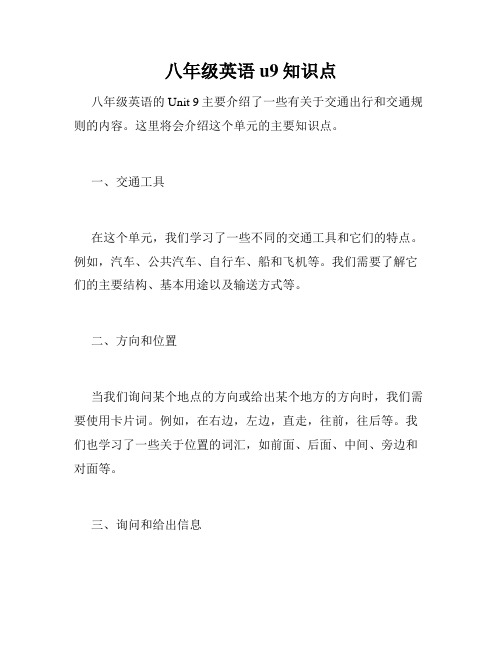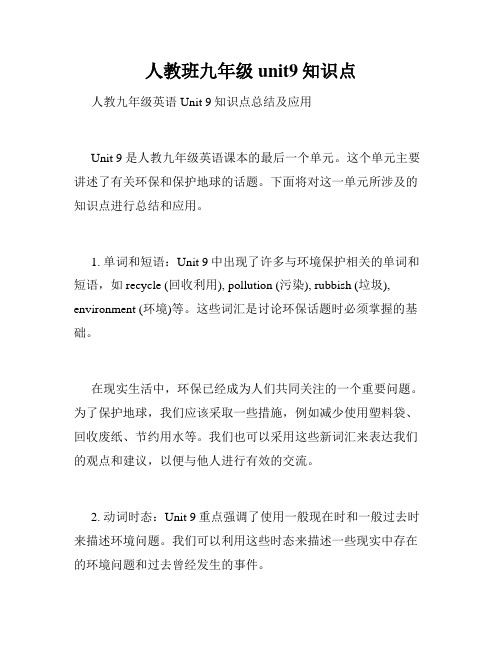Unit 9重点总结
九年级英语unit9重点知识点

九年级英语unit9重点知识点Unit 9: Key Concepts in 9th Grade EnglishEnglish is one of the most widely spoken languages in the world, and being proficient in it is essential for communication, education, and career opportunities. In the 9th grade, students are introduced to various key concepts that build upon their previous knowledge and enhance their understanding of the English language. This article highlights some of the key knowledge points covered in Unit 9 of the 9th grade English curriculum.1. Vocabulary Expansion: Building a Strong LexiconExpanding vocabulary is crucial to effective communication. In Unit 9, students learn new words and phrases that are relevant to different aspects of everyday life. This includes vocabulary related to technology, sports, entertainment, and much more. Engaging in activities such as reading books, newspapers, and online articles, or even watching movies or documentaries in English, can significantly contribute to vocabulary expansion.2. Grammar: Polishing Language MechanicsGrammar forms the framework upon which effective communication is built. Unit 9 focuses on fine-tuning grammar skills, such as understanding verb tenses, subjunctive mood, conditional sentences, and reported speech. Students learn to apply these rules in both written and spoken forms, enabling them to express themselves with clarity.3. Speaking and Listening: Effective Communication SkillsDeveloping strong speaking and listening skills goes beyond textbook learning. Unit 9 provides opportunities for students to engage in discussions and debates, honing their ability to communicate their thoughts and opinions effectively. Practicing active listening, paying attention to intonation, stress, and pronunciation helps students understand spoken English better and improves their overall comprehension skills.4. Reading Comprehension: Extracting MeaningUnit 9 places emphasis on improving students' reading comprehension skills. Students learn strategies such as skimming and scanning, context clues, and identifying the main idea and supporting details. These techniques enable them to extract meaning from a variety of texts, including literature, informational articles, and opinion pieces.Encouraging students to read widely in their free time helps reinforce these skills.5. Writing: Crafting Engaging TextsEffective writing entails being able to express thoughts coherently and engagingly. In Unit 9, students learn to write different types of texts, including narratives, descriptive essays, and persuasive arguments. They also refine their abilities in generating relevant ideas, organizing their writing, and using appropriate language features. Regular writing practice, such as keeping a journal, can greatly improve writing skills.6. Literature: Exploring Literary DevicesUnit 9 delves into the world of literature, exposing students to various literary genres and devices. Students analyze prose, poetry, and drama, examining elements like plot, character development, figurative language, theme, and symbolism. Exploring literary works not only enhances critical thinking skills but also fosters imagination.7. Cultural Understanding: Embracing Diversity and PerspectiveLanguage and culture are inseparable. Unit 9 aims to cultivate cultural understanding by exploring different English-speakingcountries, their traditions, customs, and celebrations. Students are encouraged to appreciate the rich diversity of cultures, fostering tolerance and empathy.Unit 9 in 9th-grade English provides a comprehensive foundation for building language skills. By focusing on vocabulary expansion, grammar mechanics, effective communication, reading comprehension, writing, literature, and cultural understanding, students develop a holistic understanding of the English language and foster a lifelong love for learning and using English effectively.。
七年级上册英语unit9知识点总结

七年级上册英语unit9知识点总结本文旨在总结七年级上册英语Unit9的主要知识点,帮助同学们更好地掌握这一单元内容。
一、语法知识点1.一般现在时一般现在时表示现在经常或习惯性发生的动作或状态,其结构为:主语+动词原形。
如:He goes to school by bus every day.I usually play basketball with my friends on weekends.2. be动词的一般现在时be动词的一般现在时表示现在的状态或真实情况,其结构为:主语+am/is/are。
如:I am a student.She is very beautiful.3.动词的-ing形式动词的-ing形式表示进行中的动作或状态,其结构为:be动词+动词-ing形式。
如:I am reading a book.She is singing a song.4.物主代词物主代词用来表示所属关系,常见的物主代词有:my、your、his、her、its、our、their。
如:This is my book.That is her phone.5.名词单复数英语中,名词既有单数形式,也有复数形式。
复数形式有规律的变化,通常加s或es。
如:One car, two cars.One watch, two watches.二、词汇知识点1.动词词组动词词组是由动词和一个或多个其他词组成的短语,常用的动词短语有:get up、go to bed、have breakfast/lunch/dinner、take a shower/bath、watch TV等。
如:I usually get up at six o'clock.She takes a shower before going to bed.2.描述人外貌和性格的词汇在英语中,常用来描述人的外貌和性格特征的词汇有:tall、short、thin、fat、pretty、handsome、kind、nice、friendly等。
九年级上册英语unit9重点知识点

九年级上册英语unit9重点知识点九年级上册英语Unit 9重点知识点九年级上册英语Unit 9是学习课文《Can you come to my party?》的重点单元。
在这个单元中,学生需要掌握一些重要的知识点,包括常用表达方式、时态用法、词汇拓展等内容。
在本文中,我们将对这些知识点进行详细的分析和介绍。
一、常用表达方式在Unit 9中,有一些常用的表达方式需要我们掌握和运用。
例如,当你邀请别人参加你的派对时,可以用句型“Do youwant/like/love to come to my party?”。
回答时,可以使用句型“I'd love/like to.”或者“Sorry, I can't.”来表示接受或拒绝邀请。
此外,还有一些其他的表达方式,比如“Are you available on...?”(你...有空吗?)和“Could you please...?”(你可以...吗?)等等。
二、时态用法在Unit 9中,我们需要灵活运用一些时态来描述过去、现在和将来的动作。
例如,当询问别人是否有空来参加你的派对时,可以用现在进行时来表示将来的行动,如“What are you doing onSaturday night?”(你周六晚上有什么安排?)。
当接受他人的邀请时,可以用将来时来表达,如“I will come to your party.”(我会来参加你的派对)。
同时,还需要注意一些常用的过去时态,如一般过去时和过去进行时。
三、词汇拓展在Unit 9中,我们还需要掌握一些与派对相关的词汇,并学会拓展应用。
例如,单词“party”可以和其他单词组合形成其他表达方式,比如“birthday party”(生日派对)、“costume party”(化妆舞会)等等。
此外,还有一些与时间和日期有关的词汇,如“next week”(下周)、“last night”(昨晚)、“tomorrow”(明天)等等。
八年级英语u9知识点

八年级英语u9知识点
八年级英语的Unit 9主要介绍了一些有关于交通出行和交通规则的内容。
这里将会介绍这个单元的主要知识点。
一、交通工具
在这个单元,我们学习了一些不同的交通工具和它们的特点。
例如,汽车、公共汽车、自行车、船和飞机等。
我们需要了解它们的主要结构、基本用途以及输送方式等。
二、方向和位置
当我们询问某个地点的方向或给出某个地方的方向时,我们需要使用卡片词。
例如,在右边,左边,直走,往前,往后等。
我们也学习了一些关于位置的词汇,如前面、后面、中间、旁边和对面等。
三、询问和给出信息
在交通出行中,询问方向、地点和其他相关信息非常重要。
因此,在这个单元,我们学习了一些有关如何有效地进行信息交流
的语言表达方法。
例如,如何向他人提问和回答问题,如何描述
位置,如何提供和请求帮助等。
四、指示词和冠词
在描述交通工具、位置和方向时,我们需要使用指示词和冠词。
这些词语能够帮助我们更清楚地表达意思,如this、that、these、those、a、an和the等。
五、交通规则
学习关于交通规则是出现意外事故和确保人身安全的关键。
在
这个单元里,我们学习了一些常见的交通规则,如穿过马路时如
何确保自己的安全,如何识别交通标记等等。
总结
通过学习这个单元,我们可以更好地了解有关交通出行及其相关信息的表达方法,同时学习了如何提供和请求帮助,如何保障自己的人身安全以及关于交通规则的知识。
这些知识点不仅适用于英语学习,也将对我们的日常生活有所帮助。
九年级unit9知识点

九年级unit9知识点九年级Unit 9知识点作为九年级学生,Unit 9是我们学习中的一个重要环节。
在这个单元中,我们将学习许多新知识点,这些知识将对我们的学习和未来的发展起到重要的作用。
本文将对九年级Unit 9的知识点进行介绍和总结。
一、单词和词组在Unit 9中,我们将学习到许多新的单词和词组,这些词汇将丰富我们的词汇量,并有助于我们更好地理解和运用英语。
以下是本单元中的一些重要词汇:1. pollution - 污染2. environment - 环境3. recycling - 回收利用4. global warming - 全球变暖5. fossil fuels - 化石燃料6. renewable energy - 可再生能源除了上述单词外,我们还需要学习一些相关的词组,如:1. take action - 采取行动2. make a difference - 有所作为3. reduce carbon footprint - 减少碳足迹4. raise awareness - 提高意识5. conserve energy - 节约能源二、语法知识在Unit 9中,我们将学习到一些重要的语法知识,这些知识将帮助我们更好地构建句子,并准确地表达自己的想法。
以下是本单元中的一些重要语法知识点:1. 情态动词的用法:如can, could, may, might等,用于表示能力、请求、许可、推测等。
2. 定语从句的用法:用来修饰名词,并提供更多描述性的信息。
3. 间接引语:用于转述别人说过的话,并进行适当的调整。
值得注意的是,在使用上述语法结构时,我们要注意时态、语态和语气的正确运用,以便更加准确地表达自己的意思。
三、阅读和写作在Unit 9中,我们将有机会进行一些阅读和写作练习,以提高我们的阅读理解和写作能力。
在进行阅读练习时,我们应该注重理解文章的主旨、细节和推理能力。
此外,在写作方面,我们将学习如何写一篇关于环保的短文或文章,以及如何论述自己的观点并提供支持性的证据。
九年级英语unit9知识点梳理

九年级英语unit9知识点梳理九年级英语Unit 9 知识点梳理在九年级英语学习中,Unit 9 是一个重要的单元,它涵盖了广泛的知识点,包括情态动词、被动语态以及名词性从句等。
本文将对这些知识点进行梳理和总结。
一、情态动词情态动词在英语中有着重要的作用,可以表达各种各样的意义和语气。
在Unit 9 中,我们学习了几个常用的情态动词,如can, could, may, might, must等。
它们用于表达能力、推测、可能性和必须性等不同的意义。
例如,在表达能力时,我们可以说“I can swim”,表示我能够游泳;在推测时,我们可以说“It might rain tomorrow”,表示明天可能会下雨。
情态动词的使用不仅能够丰富我们的语言表达,还能提高我们的语言灵活度和准确性。
二、被动语态被动语态是英语中的一种重要句型结构,它表示动作的承受者是动作的执行者。
在Unit 9 中,我们学习了如何构成和使用被动语态。
被动语态的基本结构是:be动词 + 过去分词。
例如,“The cake was made by my mom”(这个蛋糕是我妈妈做的)。
被动语态的使用可以使文章或句子更加流畅和自然,同时也强调了动作的接受者或结果。
三、名词性从句名词性从句是由一个或多个单词组成的从句,用作名词在句中的成分。
在Unit 9 中,我们学习了三种类型的名词性从句:主语从句、宾语从句和表语从句。
主语从句在句中充当主语的角色,宾语从句在句中充当宾语的角色,而表语从句则充当表语的角色。
这些从句能够帮助我们更加灵活地运用句子结构,使句子更加丰富多样。
例如,“What he said is true”(他说的话是真实的),在这个句子中,主语从句“What he said”充当了主语的角色。
四、其他语法知识点除了上述的几个重点知识点外,Unit 9 还包含了其他一些语法知识,如祈使句、虚拟语气等。
祈使句是用来表达请求、命令或建议的句子。
人教班九年级unit9知识点

人教班九年级unit9知识点人教九年级英语Unit 9知识点总结及应用Unit 9 是人教九年级英语课本的最后一个单元。
这个单元主要讲述了有关环保和保护地球的话题。
下面将对这一单元所涉及的知识点进行总结和应用。
1. 单词和短语:Unit 9中出现了许多与环境保护相关的单词和短语,如recycle (回收利用), pollution (污染), rubbish (垃圾), environment (环境)等。
这些词汇是讨论环保话题时必须掌握的基础。
在现实生活中,环保已经成为人们共同关注的一个重要问题。
为了保护地球,我们应该采取一些措施,例如减少使用塑料袋、回收废纸、节约用水等。
我们也可以采用这些新词汇来表达我们的观点和建议,以便与他人进行有效的交流。
2. 动词时态:Unit 9重点强调了使用一般现在时和一般过去时来描述环境问题。
我们可以利用这些时态来描述一些现实中存在的环境问题和过去曾经发生的事件。
例如,我们可以说:"People throw rubbish everywhere, which pollutes the environment." (人们到处乱扔垃圾,这污染了环境。
) 或"Last year, there was a big fire in the forest near my hometown." (去年,在我家乡附近的森林里发生了一场大火。
)这些时态的正确使用可以让我们更加生动地描述环境问题,有效地与他人交流。
3. 句子结构:在Unit 9中,出现了一些复杂的句子结构,如宾语从句,定语从句和条件句等。
这些结构的使用可以让我们的句子更加丰富多样。
例如,我们可以说:"I believe that if everyone recycles, we can make the world a better place." (我相信,如果每个人都回收利用,我们可以使世界变得更美好。
2023年人教版九年级英语第九单元知识点总结

人教版九年级英语第九单元知识点总结Unit 9 I like music that I can dance to.单词Prefer lyrics Australia electronic suppose smooth spare director case in that case war stick Stick to shut shut off down dialog ending documentary dram plenty of superhero sadness pain moving lifetime pity total in total master recall wound painful once in a while intelligent sense. reflect .perform praise一.1. dance to music 伴随音乐起舞 2. sing along with 伴随……一起唱 3. musicians who play different kinds of music 弹奏不一样类型音乐旳音乐家 4. electronic music 电子音乐5. not much=nothing much 没什么(事)6. suppose sb. to do sth. 猜测某人做某事be supposed to do sth. 应当做某事suppose sb (to be) +adj. 原认为某人是……7. have spare time 有空闲时间in one's spare time 在某人旳空闲时间spare the time to do sth. 抽时间做……8. think too much 想得太多;过度思索9 in that case 既然那样10. World War II 第二次世界大战11. smooth music 悦耳旳音乐12. prefer A to B 比起B来更喜欢A prefer doing A to doing B 乐意去做A而不是去做B prefer to do A rather than do B 宁愿做A而不做B 13. feel like doing sth. 想要做某事=want to do sth. =would like to do sth. 14. stick to 坚持,固守15. be down 悲伤,沮丧16. cheer sb up 使…快乐/ 振奋17. have a happy ending 有个美满旳结局18. less serious 不那么严重19. a good way to do sth. 做某事旳好措施20. shut off 关闭21. in time 及时on time 准时/准时22. once in a while 偶尔旳;有时=sometimes /at times 23. write one's own lyrics 自己写歌词24. take sb to sp. 带某人去某地25. Chinese folk music 中国民间音乐26. be played on the erhu 由二胡演奏旳27. move sb. 感动某人(sb. be moved by sth.)28.strangely beautiful 异常旳/出奇旳美29. sense a strong sadness and pain 感觉到一种强烈旳伤感和痛苦30. the most moving pieces of music 最令人感动旳乐曲31. the city of Shantou = Shantou city 汕头市32. by age 17 到十七岁旳时候33. musical ability 音乐才能34. develop a serious illness 得了一种很重旳病35. become blind 成了盲人;变瞎36. make money 盈利37. get married (to sb.) (和某人)结婚38. continue to do sth. 继续去做某事(另一件事)continue doing sth. 继续做着某事(同一件事)39. perform in this way 用这种形式演出40. during/ in one's lifetime 在某人有生之年41. by the end of ... 到……末为止(时间)at the end of ... 在……尽头/末梢(时间、地点)42. It's a pity that ... 遗憾旳是……43. in total 总共44. be recorded for the future world to hear 被记录下来供后人聆听45. praise ... for ... 由于……赞美46. China's national treasures 中国旳国家珍宝47. paint a picture of ... 描绘了一幅……画48. recall one's deepest wounds 唤起某人最深旳伤痛49. painful experiences 痛苦旳经历50. a time for spreading joy 传播快乐旳时间51. live a very hard life.过着艰苦旳生活。
- 1、下载文档前请自行甄别文档内容的完整性,平台不提供额外的编辑、内容补充、找答案等附加服务。
- 2、"仅部分预览"的文档,不可在线预览部分如存在完整性等问题,可反馈申请退款(可完整预览的文档不适用该条件!)。
- 3、如文档侵犯您的权益,请联系客服反馈,我们会尽快为您处理(人工客服工作时间:9:00-18:30)。
九年级英语Unit 9 重点总结1. 被动语态(1). 被动语态表示句子的主语是谓语动词所表示的动作承受者。
(2). 被动语态基本结构:be+及物动词的过去分词,(如果是不及物动词,其过去分词应带有相应的介词)(3). 被动语态中的be 是助动词,有人称、数和时态的变化。
一般现在时被动语态为:am/is/are+过去分词一般过去时被动语态为:was/were+ 过去分词与情态动词连用的被动语态:情态动词+ be + 过去分词(4). 被动语态中动作的发出者或执行者做介词by的宾语,放在句末,by 表示“由,被”的意思Section A.2. 本单元要掌握的句型见课本P69 中的Grammar FocusWhen was the car invented ? It was invented in 1885.When were electric slippers invented? They were invented last year.Who were potato chips invented by ? They were invented by George Crum .What are stamps used for ? They are used for sending letters ./are used to send letters3. be used for doing用来做…(是被动语态),可以和be used to do 互相转换如:Pens are used for writing. 笔是用来写的。
Pens aren’t used for eating. 笔不是用来吃的。
4. invent v. 发明inventor n. 发明家invention n. 发明可数名词如:哪一个发明家去年发明了那项有用的发明?Which _______________ _______________ the useful _______________ last year?5. 给某人某样东西give sth. to sb.= give sb. sth.如:I gave a pen to him./ I gave him a pen. 我给他一支笔。
相同的可以跟双宾主的动词有:(这里的“物”是直接宾语,“人”是间接宾语)show/pass/offer/bring sb. Sth. = show/pass/offer/bring sth. to sbmake(制造)/buy/get sb. Sth. =make/ buy/get sth. for sb.请注意他们在变被动语态时的两种情况:I.把间接宾语变为被动语态的主语,直接宾语仍留在原位。
My grandfather gave me(间接宾语) a dictionary (直接宾语) last ye ar.→I was given a dictionary by my grandfather last year.II. 把直接宾语变为被动语态主语时,则要在间接宾语前加介词to,而make(制造),buy,get (买)要用for)My grandfather gave me(间接宾语) a dictionary (直接宾语) last year.→A dictionary was given to me by my grandfather last year.6. all day 整天all night 整夜all day and all night7.What do you think is the most useful invention ?试从下面几方面理解:1. 当”do you think “是插入语,后面要用陈述语序试翻译:你认为我应该做什么呢?下面A, B哪一个正确?A. What do you think I should do?B. What do you think should I do?2. 你知道What is the most important thing for you ? 其中What 是主语,What do you think is the most important thing for you?Section B7. salty adj. 咸的salt n. 盐Have you tasted the soup with _______ (盐)? It is so __________ (咸的)8. by mistake 错误地Do you know that potato chips were invented by mistake?如:I took the umbrella by mistake. 我错误地拿错了雨伞。
9. make sb./sth. +形容词(做宾语补足语) 使…怎么样It made me happy. 它使我高兴make sb./sth. + 省to 的不定式(做宾语补足语) 让…做… 这里主动语态中省to,被动语态中要加to . 如:The boss made the workers work all day and all night in rhe past.→ The workers were made to work all day and all night in the past.10. in the end 最后= at last = finallyby the end of +过去的时间状语, 常用于过去完成时态We had learned more than 2000 words by the end of last term.at the end of the meeting 在会议快结束的时候at the end of the street 在街道的尽头at the end of this week 在本周末We plan to have a picnic at the end of this week.10. by accident 意外偶然The most popular drink in the world was invented by accident?如:I met her by accident at bus stop. 我在公共汽车站意外地见到了她。
11. not…until… 直到……才……Tea wasn’t brought to the Western World until 1610.如:I did n’t go to bed until I finished my work. 我直到完成我的工作才去睡觉。
12. according to +名词根据……according to an ancient Chinese legend 根据一个古老的中国神话如:according to this article 根据这篇文章According to Mr. Black , there will be a heavy rain tomorrow .13. over an open fire 在户处的火上over不接触但垂直, on 接触垂直, above不接触不垂直There is a bridge ______ the river.There is a bird flying _______ his head.14. leaf n. 叶子复数形式leaves thin enough / salty enough15. nearby adj. 附近的a nearly bush.如:the nearby riversometime 某个时候sometimes : at times 有时some time 一段时间some times 几次The bunch of flowers remained in the bottle for_________.(一段时间)I have been to Shanghai ___________.(几次)Most of the studtents __________ make mistakes. (有时)Are you sure you will see him ____________.(某个时候)14.fall into 落入掉进Some leaves from a nearby bush fell into the water. fall down 摔倒如:She fell down from her bike. 她从她自行车摔倒了。
fall down ( from )= fall off (从)…跌倒She fell off her bike.17. quite 非常adv. 与冠词a连用时,冠词a一般放在它的后面如:quite a beautiful girl 一个漂亮的女孩very 非常adv. 与冠词a连用时,冠词a必须放在它的前面如: a very beautiful girl 一个漂亮女孩注:当不与冠词a 连用时,两者可以互用如:I am very happy.=== I am quite happy. 我非常高兴。
18. in this way 这样如:In this way they grew from weak to strong. 就这样他们变得由弱到强。
on the way to + n. 在去……的路上,on one’s way home/to the hospitalby the way 顺便说一下in one’s way 挡……的路,碍……事如:Go along with you now! You're _____________! 滚开!你碍我事了。
________________ , what’s your hobby?____________________ back home , I dropped in at my brother's house在我回来的路上,我顺便到我兄弟家去看了看。
19. pleased adj. 表示外部因素引起人发自内心的欣慰和愉快be pleased with sth.pleasant adj. 愉快高兴指天气、时间、旅行等物令人高兴愉快= pleasingplease v.使高兴使同意What you did yesterday __________ your mother.We are __________ with what the teacher told usThe trip to Hainan several days ago was _____________.20. battery—operated adj. 电池控制的是名词+动词的过去分词构成的合成形容词21. in the sixth century 在第6世纪Reading22. travel around China 周游全国travel around the world 周游世界23. more than === over 超过如:more than a hundred years old24. including prep.介词包括可以与名词和动名词连用如: Six people, including a baby, were hurt. 6个人包括一个小孩受伤了。
